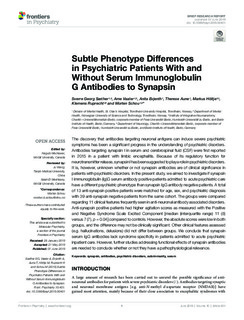| dc.contributor.author | Sæther, Sverre Georg | |
| dc.contributor.author | Vaaler, Arne | |
| dc.contributor.author | Evjenth, Anita | |
| dc.contributor.author | Aune, Therese Lie | |
| dc.contributor.author | Höltje, Markus | |
| dc.contributor.author | Ruprecht, Klemens | |
| dc.contributor.author | Schou, Morten Brix | |
| dc.date.accessioned | 2019-06-17T06:39:09Z | |
| dc.date.available | 2019-06-17T06:39:09Z | |
| dc.date.created | 2019-06-14T11:29:10Z | |
| dc.date.issued | 2019 | |
| dc.identifier.citation | Frontiers in Psychiatry. 2019 | nb_NO |
| dc.identifier.issn | 1664-0640 | |
| dc.identifier.uri | http://hdl.handle.net/11250/2600921 | |
| dc.description.abstract | The discovery that antibodies targeting neuronal antigens can induce severe psychiatric symptoms has been a significant progress in the understanding of psychiatric disorders. Antibodies targeting synapsin I in serum and cerebrospinal fluid (CSF) were first reported in 2015 in a patient with limbic encephalitis. Because of its regulatory function for neurotransmitter release, synapsin I has been suggested to play a role in psychiatric disorders. It is, however, unknown whether or not synapsin antibodies are of clinical significance in patients with psychiatric disorders. In the present study, we aimed to investigate if synapsin I immunoglobulin (Ig)G serum antibody positive patients admitted to acute psychiatric care have a different psychiatric phenotype than synapsin IgG antibody negative patients. A total of 13 anti-synapsin positive patients were matched for age, sex, and psychiatric diagnosis with 39 anti-synapsin negative patients from the same cohort. The groups were compared regarding 11 clinical features frequently seen in anti-neuronal antibody associated disorders. Anti-synapsin positive patients had higher agitation scores as measured with the Positive and Negative Syndrome Scale Excited Component [median (interquartile range) 11 (8) versus 7 (7), p = 0.04] compared to controls. However, the absolute scores were low in both groups, and the difference may not be clinically significant. Other clinical features assessed (e.g. hallucinations, delusions) did not differ between groups. We conclude that synapsin serum IgG antibodies lack syndrome specificity in patients admitted to acute psychiatric inpatient care. However, further studies addressing functional effects of synapsin antibodies are needed to conclude whether or not they have a pathophysiological relevance. | nb_NO |
| dc.language.iso | eng | nb_NO |
| dc.publisher | Frontiers Media | nb_NO |
| dc.rights | Navngivelse 4.0 Internasjonal | * |
| dc.rights.uri | http://creativecommons.org/licenses/by/4.0/deed.no | * |
| dc.title | Subtle Phenotype Differences in Psychiatric Patients With and Without Serum Immunoglobulin G Antibodies to Synapsin | nb_NO |
| dc.type | Journal article | nb_NO |
| dc.type | Peer reviewed | nb_NO |
| dc.description.version | publishedVersion | nb_NO |
| dc.source.volume | 10 | nb_NO |
| dc.source.journal | Frontiers in Psychiatry | nb_NO |
| dc.identifier.doi | https://doi.org/10.3389/fpsyt.2019.00401 | |
| dc.identifier.cristin | 1704928 | |
| dc.description.localcode | Copyright © 2019 Sæther, Vaaler, Evjenth, Aune, Höltje, Ruprecht and Schou. This is an open-access article distributed under the terms of the Creative Commons Attribution License (CC BY). The use, distribution or reproduction in other forums is permitted, provided the original author(s) and the copyright owner(s) are credited and that the original publication in this journal is cited, in accordance with accepted academic practice. No use, distribution or reproduction is permitted which does not comply with these terms. | nb_NO |
| cristin.unitcode | 194,65,35,0 | |
| cristin.unitname | Institutt for psykisk helse | |
| cristin.ispublished | true | |
| cristin.fulltext | original | |
| cristin.qualitycode | 1 | |

